
A couple of hours away from the restart. Kind of funny -- much like several of the events this summer that ran into that “hard stop” rule causing just three or four players to come back the following afternoon to play out their tourneys, the Main Event is following suit in the way it stopped the final table Sunday with three remaining.
But as I was saying
yesterday, I like that we have three players left rather than just two. It’s sort of like “Final Jeopardy” or something, with the leader’s advantage a bit less secure thanks to dynamic of having two opponents and not one, vying both against each other as well against him.
Here’s how the stacks will look like with tonight’s first hand, the 179th of the final table:
Pius Heinz -- 107,800,000
Ben Lamb -- 55,400,000
Martin Staszko -- 42,700,000
The winner tonight gets $8,715,638, the runner-up $5,433,086, and the third-place finisher $4,021,138.
They’ll still be in the middle of Level 40 when they resume, where the blinds are 600k/1.2m with a 200k ante. Meaning Staskzo starts tonight with about 35 big blinds, Lamb about 46, and Heinz nearly 90. Not sure but I think they’ve got about an hour to go there before the end of the level.
Last year Jonathan Duhamel and John Racener came back to heads-up near the end of Level 40, then played a little more than half of the two-hour Level 41 before finishing up. In 2009, Joe Cada finished off Darvin Moon just before Level 40 was completed.
Much depends on the cards, of course, but I’m leaning toward thinking tonight will be a relatively short one. I can say that without hesitation, of course, since I’m not there working the sucker. Usually if someone covering an event live says something out loud about the night being a short one, that automatically dooms everyone to a long, long night. And that person is then given appropriate hell for having uttered such folly.
No, I’m home watching the coverage “almost live” on the teevee on ESPN. Those outside of the U.S. can watch it streaming online over at
WSOP.com. And there are some other ways to see the action, too -- see the start of
my Sunday post for details.
Gonna grab some dinner. Will be back here in a couple of hours once the show gets started.
5:45 p.m.As I did on Sunday, I’ll time stamp these posts using Vegas time even though I’m three hours ahead here on the east coast. Just finished dinner and am now settling on the couch, readying for the big show.
Got to watch the live stream of the Poker Hall of Fame induction ceremony over on the WSOP site, which was a nice thing for them to make available. As
I mentioned earlier today, I was glad to see both Greenstein and Johnson make it this year as deserving candidates.
Turning our attention to the restart of the final table... we can assume all three players watched the nine-plus hours of coverage from Sunday with a close eye. Extra information all around, although again I think we might be assuming too much to think it necessarily will affect the players’ strategies
too greatly.
Then again, having seen something on the broadcast might well alter just one decision. And as we know, in a poker tourney just one decision can alter everything.
6:20 p.m.Whoa. Even before the live feed began, I’d seen the tweets about Ben Lamb’s king-jack jam. What the heck?
“Ben Lamb has been on top of his game” throughout the Main Event said Antonio Esfandiari in the intro. “I cannot remember one blow up,” he added. Hmm... gotta see this hand!
By the way, it’s Esfandiari doing the analysis, Lon McEachern handling the play-by-play, and Norman Chad providing a few jokes here and there tonight. No Phil Hellmuth this time, I don’t believe. Nor are they planning to have guests come around, either.

The excited tweets continued as the players were shown sitting down. By then I was reading how Staszko had already moved from third to first (in just two hands!). Meanwhile the commentators spoke of the aggressive Heinz surely controlling the table.
In that first hand, Lamb opened with a raise to 3 million from the small blind, then Staszko quickly made it 7.5 million from the BB. Lamb thought about a minute, then pushed all in. Staszko didn’t take that long -- maybe 20 seconds -- then called.
Lamb tabled


and Staszko


. “This is insane action” said Esfandiari. The board ran out





, and just like that Lamb’s down to just over 10 big blinds!
“I can't blame him for doing what he did,” said Esfandiari afterwards, alluding to how Staszko may well three-bet light there. He also referred to the players having watched the video from Sunday, implying that may have affected Lamb's thought process. Well, there will be plenty of time to break that one down in the coming months.
And Czech this... Staszko took the second hand from Heinz and now has the chip lead! He picked up pocket kings versus the
K-Q of Heinz and ended up getting a couple of postflop streets of value from the German. What a start!
6:35 p.m.“Now he is down to almost mutton,” tweeted Scarlet “
PokerScar” Robinson about Lamb just a moment ago. And now, just four hands in, it’s over for the Oklahoman.

In the small blind again, Lamb open-shoved his last 10.9 million with
Q-6 and Staszko woke up with pocket jacks. (That makes three pocket pairs in four hands for the Czech.) Board came
5-5-2-2-7, and Lamb’s night ends quickly.
He seemed in good spirits talking to Kara Scott afterwards as he briefly broke down the reasoning for the
K-J shove.
Two to go. Will be a first-ever bracelet for either Germany or the Czech Republic.
Martin Staszko -- 117,300,000
Pius Heinz -- 88,600,000
6:50 p.m.Heinz has retaken the chip lead in a big one where he pushed all in on the river to force a fold from Staszko (
Hand #187).
Staszko limped from the button (as he has done a few times), Heinz raised, and Stasko called. Heinz then fired two bullets as the board came




, and Staszko called both. The river brought the

and a check from Heinz, and Staszko took the invitation to bet. Heinz then surprisingly check-raised all in, and Staszko relented.
On the feed we saw the hands -- Staszko had a pair with


(and had limp-called the button with an ace). Meanwhile Heinz had made two pair with


.
7:30 p.m.After that initial flurry and Heinz retaking the lead from Staszko, the pair have settled in and traded chips for a couple dozen hands, with Heinz gradually chipping a bit at the Czech player’s stack.
Was an exciting opening to the broadcast, but I’m starting to wonder how well this sequence is holding the audience on ESPN. Folks on Twitter are debating the advantage of seeing hole cards from the start of the hand, something that helps sustain the interest of casual viewers a lot more than the strategy discussions and speculation about holdings we poker players enjoy.
Level 41 has begun (200k/800k/1.6m).
Pius Heinz -- 128,200,000
Martin Staszko -- 77,700,000
8:10 p.m.Dr. Pauly is live blogging again tonight from the Rio.
Check his coverage here. Am also refreshing
the PokerNews page, although I could do without that autoplay “Entertainment” video on there that you can’t turn off until after the first clip completes.
Starting to look like these two might take a while to settle this sucker. There’s been plenty of action, including several hands not just making it to the flop but all of the way to the river and a showdown, but no big all ins. And no one (since that Hand #187) looking too anxious to start flipping for the bracelet. Not yet.
In Hand #203 (the 25th of the final-table and 21st of heads-up), Staszko grabbed the lead when a river card gave both players two pair, but Staszko's were better.
Then three hands later a river bet by Heinz pushed Staszko off a hand and gave the German the advantage once more.
Hand #210 saw Heinz four-bet preflop and get a fold from Staszko. Heinz had


in that one, and Staszko


.
8:25 p.m.Well that was interesting.

On Hand #211, Staszko called a preflop three-bet from Heinz, then a half-pot c-bet on the
7-2-10 flop. An ace fell on the turn, and Heinz bet 21.3 million -- about half the pot. Staszko gave Heinz a quick look, studied his chips for a moment, then declared he was all in. Heinz quickly folded.
Expected to learn Staszko had an ace at least, but he had
K-Q! And Heinz
J-9. Good read.
Starting to dig that plaid shirt.
Martin Staszko -- 122,400,000
Pius Heinz -- 83,500,000
8:55 p.m.The 50th hand of the day (Hand #228 overall for the final table) saw Staszko push out to a better than 2-to-1 lead over Heinz.
Heinz opened for 3.4 million from the button and Staszko called. The flop came



and Staszko check-called a 3.8 million bet from Heinz. The turn was the

, and Staszko checked again. Heinz bet 8.4 million this time, and Staszko check-raised to 18.5 million. Heinz called.
The river was the

and when Staszko bet 20.25 million Heinz let it go. Staszko, it turns out, had the nuts with


, while Heinz had gone to the river with


.
Have to wonder what would have happened if Staszko had checked the river -- would Heinz have tried to bluff it? That had to have been the plan after the turn call. Staszko has over 141 million now, while Heinz has slipped under 65 million.
9:05 p.m.It does not appear as though either player is leaving the table at all to consult with their respective rails about what is being shown on the 15-minute delay. I’m sure they’ll get caught up on the breaks, particularly with regard to the bigger hands. But for now it looks like they’re essentially playing this out without constantly collecting the extra available info.
9:35 p.m.They’ve pushed all of the way through to the end of Level 41, with Heinz taking a series of small-to-medium pots from Staszko to pull back even, then take the lead.

Oskar Garcia, the Associated Press reporter who covers casinos and the gambling scene there in Vegas, has tweeted this groovy graph showing how the chips have been moving around thus far tonight.
Looks like those yellow and blue lines have intersected more than a half-dozen times already, each instance denoting another lead change. By the way, for poker people, Oskar is a guy worth following (
@OskarGarcia).
9:55 p.m.Yet another lead change. On the first hand of Level 42 (300k/1m/2m), preflop back-and-forthing ended with Staszko five-bet shoving and Heinz letting his hand go.
We got to see Heinz had gotten a little randy with


while Staszko held


. A little over 20 million goes from Heinz to Staszko on that one.
Martin Staszko -- 109,900,000
Pius Heinz -- 96,000,000
10:25 p.m.The tide appears to be turning in the Czech's direction in a significant way.
In Hand #257 -- the 75th of heads-up play -- the board showed





and about 20 million sat in the middle. Heinz checked, Staszko bet 10 million, and after a lot of hemming and hawing Heinz finally called to see his plaid-shirted opponent flip over


for a turned king-high straight.
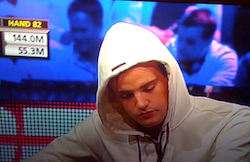
Heinz looked pretty disgusted as he mucked, and we got to see he had


for top pair.
Staszko picked up another pot shortly after that and is closing in on a 3-to-1 lead now.
Martin Staszko -- 146,300,000
Pius Heinz -- 59,600,000
11:20 p.m.This heads-up match is turning into the opposite of what televised poker has traditionally been in the post-"boom" era. Far from an endless sequence of preflop all-ins, there has not been a
single all-in bet and call between these two during 100 hands of heads-up play.
Gotta wonder how the ratings are doing now that we have moved past 2 a.m. here in the east.
Heinz did manage to close the gap between himself and Staszko during that last stretch of hands, but the Czech then pushed back out ahead and now sits with nearly 160 million while Heinz has about 47 million. Staszko certainly appears much more comfortable than does Heinz, not to mention patient.
They are still in Level 42, where the blinds are 1m/2m.
11:50 p.m.During the last sequence we saw Heinz fold to a river bet and for the second time tonight discover he had a full house -- not the nuts, but very possibly the best hand. (And, in fact, it was the best hand both times.)
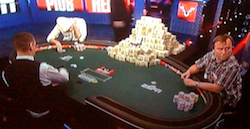
Then Heinz won seven of the next eight hands to push back up close to 80 million. Along the way came one hand in which Heinz c-bet a



flop, then Staszko raised. Heinz shoved and after a lot of thought Staszko folded. We then saw Heinz had


for fives. Meanwhile Staszko folded


, surprisingly deciding not to continue with his flush draw, even after raising.
The pair then traded next few pots and reached the end of the level and another 15-minute break.
Martin Staszko -- 124,750,000
Pius Heinz -- 81,150,000
12:15 a.m.They have begun Level 43 (300k/1.2m/2.4m), and on the very first hand of the level came the first all-in and call of heads-up.
After Staszko limped, Heinz raised to 7.9 million and Staszko called. The flop came



. Heinz bet 8.2 million, and after a couple of minutes Staszko raised to 17.5 million. Heinz riffled his chips and thought. "I don't think Heinz is gonna fold," said Esfandiari. He didn't -- he shoved all in. And Staszko called.
Heinz had two overs --


-- and Staszko


. The Czech decided to go with the flush draw this time. He had a gutshot, too, but the jack would give Heinz a better straight. (His nine was live, though.)

The turn was the

and river the

, and suddenly Heinz had 161.5 million to Staszko's 44.4 million (less than 19 big blinds).
Heinz open-shoved the next hand with
Q-10 and Staszko folded. Might well be looking at another all-in here pretty soon.
12:35 a.m.It’s over! In the 301st hand of the final table -- the 119th of heads-up play -- Martin Staszko open-shoved his last 39.5 million with


and Pius Heinz quickly called, having picked up


. The board ran out





, and that was that.

Both Heinz and Staszko played especially well, and had Staszko hit a seven, eight, or ten there on the end they might have gone on another hour.
I think a lot of folks underestimated the Czech, who came into the final table with the most chips but nowhere near the most respect of the final nine. And he appeared to have his way with Heinz for the better part of their heads-up battle, but the German hit a couple of hands on the end and things went the other way.
Fun stuff again from ESPN, although I'll admit getting a bit bleary-eyed once they'd crossed the six-hour mark. And as I mentioned before, I'm very curious to see what kind of ratings they had tonight, particularly beyond the first hour.
Am curious as well to see where all this “almost live” stuff is heading in the future. But I’m feeling almost dead right now, and so off to bed I’ll go. Thanks for reading.
Labels: *high society, 2011 WSOP, ESPN, November Nine
 Victoria Coren wrote a neat, short Guardian piece yesterday titled “How do you find the best player in the world?”
Victoria Coren wrote a neat, short Guardian piece yesterday titled “How do you find the best player in the world?”  Then comes a pronouncement about the seemingly unbeatable Lancey Howard: “The difference is that the number one man is a machine and the Cincinnati Kid is not, and was not, and never will be a machine.”
Then comes a pronouncement about the seemingly unbeatable Lancey Howard: “The difference is that the number one man is a machine and the Cincinnati Kid is not, and was not, and never will be a machine.”
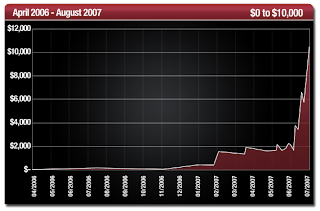



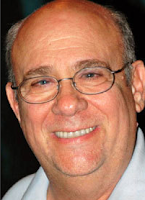



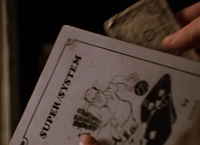













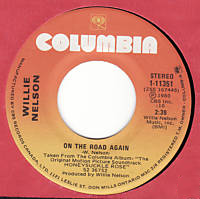

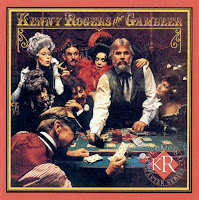


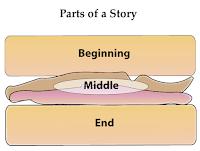


 . The pair looked at each other for several seconds while Heinz riffled his chips, then after almost a minute Heinz bet 9.8 million. Staszko looked at Heinz some more, then after about 30 seconds called.
. The pair looked at each other for several seconds while Heinz riffled his chips, then after almost a minute Heinz bet 9.8 million. Staszko looked at Heinz some more, then after about 30 seconds called. . “What an interesting card,” said Esfandiari, who then went through possible hands for Heinz. For A-K or A-Q, it was a good turn. For pocket queens or jacks, not so good. The big three-bet by Heinz before the flop -- and Staszko sticking around with calls both pre- and post-flop -- certainly made that ace on the turn interesting.
. “What an interesting card,” said Esfandiari, who then went through possible hands for Heinz. For A-K or A-Q, it was a good turn. For pocket queens or jacks, not so good. The big three-bet by Heinz before the flop -- and Staszko sticking around with calls both pre- and post-flop -- certainly made that ace on the turn interesting.
 for Heinz, and
for Heinz, and 
 for Staszko!
for Staszko!



 . “This is insane action” said Esfandiari. The board ran out
. “This is insane action” said Esfandiari. The board ran out 


 , and just like that Lamb’s down to just over 10 big blinds!
, and just like that Lamb’s down to just over 10 big blinds! 



 , and Staszko called both. The river brought the
, and Staszko called both. The river brought the 
 (and had limp-called the button with an ace). Meanwhile Heinz had made two pair with
(and had limp-called the button with an ace). Meanwhile Heinz had made two pair with  .
.
 .
.
 and Staszko check-called a 3.8 million bet from Heinz. The turn was the
and Staszko check-called a 3.8 million bet from Heinz. The turn was the  and when Staszko bet 20.25 million Heinz let it go. Staszko, it turns out, had the nuts with
and when Staszko bet 20.25 million Heinz let it go. Staszko, it turns out, had the nuts with  , while Heinz had gone to the river with
, while Heinz had gone to the river with 
 .
.

 . A little over 20 million goes from Heinz to Staszko on that one.
. A little over 20 million goes from Heinz to Staszko on that one.





 for fives. Meanwhile Staszko folded
for fives. Meanwhile Staszko folded  , surprisingly deciding not to continue with his flush draw, even after raising.
, surprisingly deciding not to continue with his flush draw, even after raising.


 . The board ran out
. The board ran out  , and that was that.
, and that was that.













